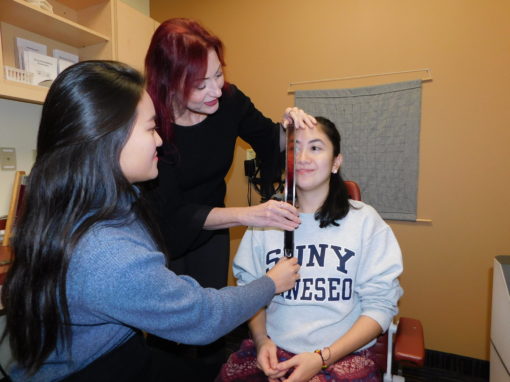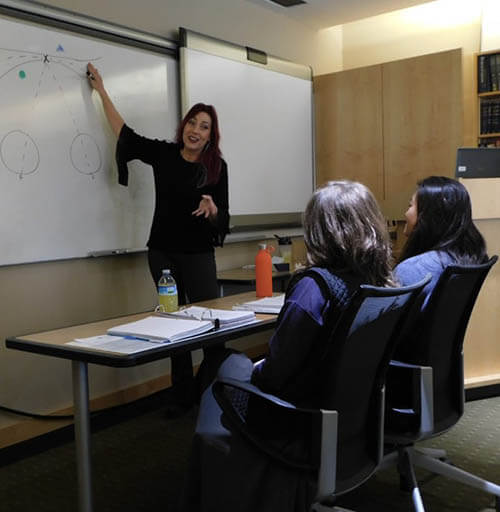
Orthoptics is an allied health profession, specializing in the evaluation and treatment of disorders of visual function, eye movements, eye alignment and binocular vision in children and adults. The orthoptist carries out a series of diagnostic tests and measurements on patients with visual function deficits, including amblyopia (lazy eye), strabismus (misaligned eyes) and diplopia (double vision), and participates with the ophthalmologist in the design and implementation of a treatment plan. In some situations, the orthoptist carries out the treatment, and in others the patient is treated medically or surgically by the ophthalmologist, while the orthoptist is responsible for monitoring the patient’s condition and progress.
The role of the orthoptist demands intelligence, sound judgment, intellectual honesty, and the ability to relate well to patients of all ages, but particularly infants, children and the elderly. Because of the nature of many disorders of visual function, most of the orthoptist’s patients are young children. While most of these children are otherwise active and healthy, some have associated physical, mental, or emotional disabilities.
Orthoptics offers opportunities for dynamic, motivated individuals who want to exercise or develop leadership ability, public speaking, creativity, teaching skills, clinical research skills, and medical writing and publication, in addition to patient care. This profession may at times combine elements of social work, education, patient advocacy, medical legal politics, and psychology, in addition to science and medicine!
Orthoptics is both intellectually challenging and rewarding, and offers a variety of job opportunities and responsibilities. Orthoptists are employed in a variety of settings: teaching hospitals, university medical centers, children’s hospitals, and solo or multi-specialty ophthalmology practices. Some orthoptists work primarily in vision research, while others have supervisory roles in the ophthalmology office. Other orthoptists work as consultants, traveling to several sites to see patients, or function as professional advisors to community agencies concerned with vision.
There is a growing demand for orthoptists in the United States. Currently, there are more jobs available than there are orthoptists graduating from schools. Orthoptists enjoy financial compensation and benefits at the high end of that earned by other allied health professions.
For more information on Orthoptics, contact:
American Orthoptic Council
Attn: Leslie France, C.O.
3914 Nakoma Road
Madison, WI 53711
lwfrance@gmail.com
(608) 233-5383
(608) 263-7694 (fax)
www.orthoptics.org

Ross Eye Institute is home to an Orthoptic Program, fully accredited by the American Orthoptic Council (AOC). The two-year course of study runs from September through August, year-round. Full-time attendance, Monday through Friday, is required, with three weeks of vacation per year. Successful graduates earn a Certificate of Completion from the Department of Ophthalmology, and are then qualified to sit for the national board examinations, given by the AOC. These examinations consist of a written exam, an oral exam and a practical exam. Those candidates successfully passing the board exams earn national certification, and are entitled to use the designation “C.O.” (Certified Orthoptist). They are also invited to join the American Association of Certified Orthoptists (AACO), a dynamic and active professional organization.
At the REI, we recognize that everyone learns differently. We try our best to create the best learning environment for all, based on the following principles.
In the Pediatric Ophthalmology Division of the REI, we work hard to create a harmonious learning and work environment. Students are encouraged to work together as a team and to support each other. We attempt to approach teaching and learning with a positive attitude, encouragement, and a sense of humor! We strive to be flexible in our approach to each topic, and we are open to adapting teaching strategies to meet the needs of each individual student.
A large part of the education in orthoptics consists of hands-on experience with patients. But the educational experience always takes priority over patient flow, as long as the dignity and respect for patients is maintained. Though our clinics are often busy, we usually have enough clinical support so that the orthoptic student will not be rushed through the exam, so as to learn as much as possible from each case.
Whether you envision your future as a teacher, a researcher, an author, or a clinician, the REI program prepares you for wherever your career may take you. But all of our students are primed for leadership roles in the profession of orthoptics. When you choose this career, you choose to become a part of a small, but growing profession. Much of that growth is due to the efforts of certified orthoptists, supporting and promoting the field. In a small profession, every single individual is important to the future, and many graduates of our program have assumed prominent roles in the American Association of Certified Orthoptists and the American Orthoptic Council.
Kyle Arnoldi, C.O., C.O.M.T. – Program Director
James D. Reynolds, M.D. – Medical Director
Andrew Reynolds, M.D. – Instructor
The study of orthoptics follows a logical sequence of courses vital to the understanding of the visual system, combined with hands-on supervised clinical practice. Didactic studies include anatomy and physiology of the eye, anatomy of the central and peripheral nervous system, physiology and kinematics of eye movement, principles of visual perception, basic ophthalmic exam techniques, pharmacology, ophthalmic optics, diagnostic testing, orthoptic treatment, systemic disease affecting the eye and principles of eye surgery. Though the majority of the internship is focused on pediatric ophthalmology, course work in adult neuro-ophthalmology, oculoplastics, external diseases of the eye and low vision are also presented. Students are required to design, complete and present a clinical research project. Students are also required to attend one regional or national AACO-sponsored scientific meeting per year.
Those individuals with education or experience in ophthalmology may be eligible for advanced standing status, provided they meet the other admission criteria. JCAHPO-certified ophthalmic medical personnel are required to have credentialing at the C.O.M.T. level in order to be eligible for advanced standing in this program.
Advanced standing students may complete an orthoptic program in less than the full 24 months, but no less than 12 months. Advanced standing is granted on an individual basis after a personal interview (mandatory), completion of a written placement exam, and pending approval by the AOC. The length of the program for advanced standing students is at the discretion of the program director. Though advanced standing may be granted, the program and medical director reserve the right to extend the length of the program for students having difficulties with the clinical or academic material.
The REI Orthoptic Program can not accept applications from those who are not U.S. citizens, unless the applicant has a Green Card. It is extremely difficult to obtain a student visa to study orthoptics in the United States.
Tuition for the full two-year program is $5,000 USD. The student is financially responsible for all living expenses during training. Students are required to purchase textbooks totaling < $500. Access to a personal vehicle is strongly recommended as students are required to travel to satellite clinics. Students are also required to attend one regional or national scientific meeting per year, and are responsible for all travel and expenses incurred.
Students in orthoptic programs do not usually qualify for student loans. However, partial scholarships based on need and merit are available for orthoptic training from two sources.
The Foundation for Orthoptic Research and Education in the Americas (FOREA)
For more information contact:
Jorie Jackson, C.O., Executive Director
joriejackson@yahoo.com
www.forea.net
The Joint Commission on Allied Health in Ophthalmology Education and Research Foundation
For more information on scholarships, contact:
JCAHPO Education and Research Foundation
2025 Woodlane Drive
St. Paul, MN 55125-2995
800-284-3937
www.jcahpo.org
The REI Orthoptic Program invites applications from Nov. 1 through February 28 from qualified individuals. Applicants are required to have earned a baccalaureate degree before entering the program. A background in the sciences is recommended, but not required. To apply, candidates must complete and submit an application, official academic transcripts, three letters of recommendation from teachers, professors or former employers, and a personal autobiographical statement. Qualified applicants will be invited for a virtual interview via Zoom. Applicants may request an on-site personal interview.
For more information on the REI Orthoptic Program, contact Program Director Kyle Arnoldi.
Kyle Arnoldi, C.O., C.O.M.T.
Program Director
Ross Eye Institute
1176 Main St.
Buffalo, NY 14209
716-881-7914
716-887-2991 (fax)
kylea@buffalo.edu
The quick contact form found in the footer of all pages.
3580 Sheridan Drive
Suite 150
Amherst, NY 14226
235 Windward Road
Orchard Park, NY 14127